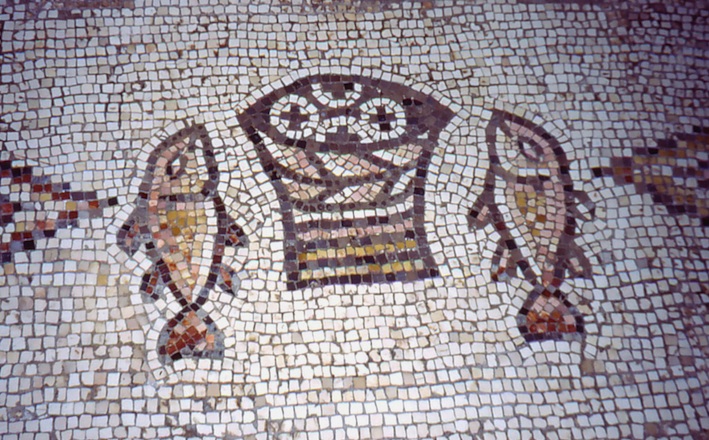Commentary on Matthew 14:13-21
This scene of feeding five-thousand-plus will be followed in 15:32-39 with the feeding of four thousand people.
Three reading contexts help to identify the significance of Jesus’ actions involving abundant food.
First is the recognition that the world of the first-century Roman Empire was marked by significant inequalities concerning food access. Many people knew food insecurity and struggled on a daily and seasonal basis for adequate food and nutrition. The empire was very hierarchical in its social structure with a small group of ruling elites who enjoyed abundant variety and good quality of food. But most of the population lived around, at, or below subsistence level with inadequate calorific and nutritional intake. The petition in the Lord’s prayer that God will supply daily bread reflects this situation (6:11).
Food access reflected the elite’s access to power that controlled resources. The lack of food was one of the ways many people experienced the injustice of this disparity of power. It is also one of the reasons we see so many sick people in the gospels. Diseases of deprivation (inadequate nutrition) and diseases of contagion (inadequate immunity) were rife.
Second, the biblical tradition explicitly identifies God’s will that hungry people be fed. God provides food for the wilderness generation (Exodus 16). Ezekiel condemns Israel’s leaders or “shepherds” for failing to feed the sheep/people (Ezekiel 34:1-10). The prophet Isaiah declares God’s will that people “share your bread with the hungry” (Isaiah 58:7, 10).
Matthew’s Jesus endorses the merciful practice of almsgiving that redistributes resources to those in need (Matthew 6:2-4). He defends the practice of procuring food as a way of honoring the Sabbath (Matthew 12:1-8). He also declares that the nations will be judged in part on whether they have provided food for the hungry (25:32-42).
Third, traditions concerned with the establishment of God’s empire in all its fullness depict this coming age in terms of abundant food and feasting for all. Ezekiel envisages an age when “the trees of the field shall yield their fruit, and the earth shall yield its increase. They shall be secure on their soil … when I break the bars of their yoke, and save them from the hands of those who enslaved them … I will provide for them a splendid vegetation so that they shall no more be consumed with hunger in the land … ” (Ezekiel 34:27-29). This age of secure and nutritional food supply comes when God breaks the self-satisfying rule of imperial powers.
Isaiah anticipates an age when “On this mountain the LORD of hosts will make for all peoples a feast of rich food, a feast of well-aged wines, of rich food filled with marrow, of well-aged wines strained clear” (Isaiah 25:6-10a). One of the reasons that the new age is often represented in terms of abundant food is the absence of such food in the present.
Jesus’ action here in Matthew 14:13-21 highlights and confronts this injustice of the Roman world with an action that enacts God’s will to feed hungry people and that anticipates the coming age in which God will supply abundant food.
Matthew’s scene is set in a “deserted place” or a “wilderness place.” The setting evokes the exodus story and God’s feeding of the wilderness generation (Matthew 14:21). It also evokes danger and safety in that Jesus “withdraws” after Herod and Herodias kill John (14:1-12), just as Moses withdraws from Pharaoh (Exodus 2:15). Jesus removes himself from the destructive reach of the urban-based Roman ally, Herod, to demonstrate a different use of power reflective of God’s empire.
Crowds join Jesus in this deserted place. Jesus’ initial response is one of compassionate power expressed in healing (14:14). The disciples approach and, stating the obvious about it being a deserted place, instruct Jesus to send the crowds away to the villages to buy food. Jesus countermands them with a challenge for the disciples to feed the crowd.
They produce the five loaves and two fish (but no little boy!). Jesus takes control and hosts the meal. He blesses the food and gives it to the disciples to distribute to the crowd. The language of “taking,” “loaves,” “blessed,” “broke” “gave to disciples”, “ate,” and “all” in 14:19 appears in the last supper scene in 26:26-27. This is not a last supper (no cup!), but the two are linked by the use of food in the dispersal of divine blessing.
Jesus enacts God’s will that hungry people be fed. He anticipates the abundant blessing of good food described by Ezekiel and Isaiah in the time when God’s empire is established in full. And he echoes the miracles of Elijah in multiplying the meal and oil of the widow of Zarephath (1 Kings 17:10-16) and of Elisha in multiplying the widow’s oil, and in feeding one hundred people (2 Kings 4:1-7, 42-44).
Verse 30 narrates the blessing here in these terms: “All ate and were filled.” Psalm 107:9 celebrates God’s action: “he satisfies the thirsty and the hungry he fills with good things.” God intervenes in this scene to multiply the limited resources so that there is abundant food. Not only is the crowd of five thousand men plus women and children fed, there are leftovers, “twelve baskets full.” Jesus demonstrates his lordship over these food resources just as he demonstrates his authority over disease, sin, Sabbath, people’s lives, and the sea.
Nor should we miss the intra-textuality between this feeding in a wilderness place and that of the previous scene, Herod’s birthday party (14:6). There in the context of the celebration of power, wealth, alliances, and status, are collisions of the ruler and the prophet, the powerful and the poor, Rome-allied imperial rule power and the purposes of God. As a result, John loses his head, served up grotesquely on a platter like another dish for the party (14:11). Imperial power is dangerous for nay-saying prophets. Jesus hosts not a death-bringing meal contextualized by tyranny, but a life-giving feast embodying the gracious abundance of God.


August 3, 2014